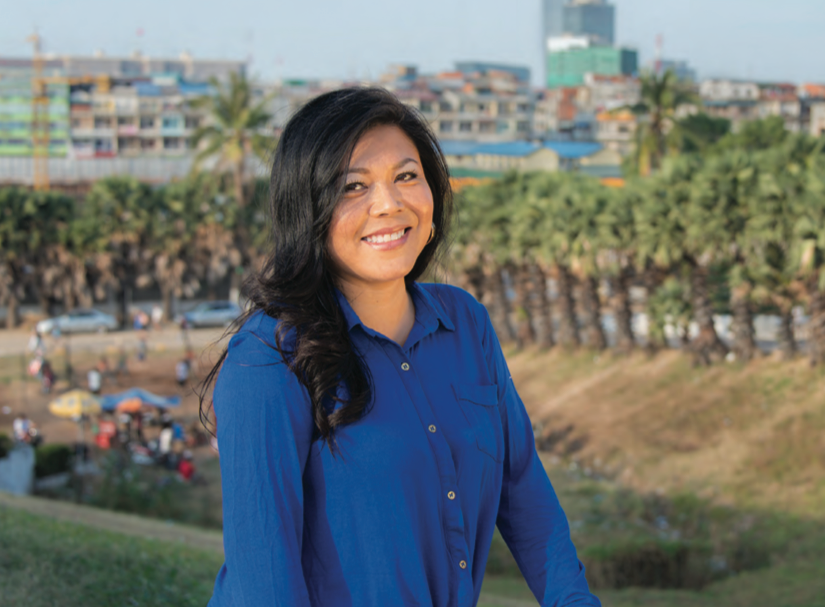Story by Jody Hanson. Photo by Brad Callihoo/Billy Otter Productions.
“It is all about education,” the gregarious Soma Norodom exclaims with infectious enthusiasm. “It is the only way out of poverty. Particularly for girls, so that is why the [Soma Norodom Foundation] is going to give scholarships to 10- to 16-year-old children from very disadvantaged circumstances, so they can study.”
Surely a noble mission, but how did the all-American Soma – homecoming princess, sports commissioner, commencement speaker of her graduating class of 1988 – end up starting a not-for-profit foundation in Cambodia?
The modern history of the Kingdom of Cambodia is best described as one of civil war and chaos. Tucked in between Vietnam and Thailand, the country was in constant danger of being swallowed by its neighbors. When the Norodom family succeeded to the throne in 1860, King Norodom I allowed the French to establish a protectorate. It wasn’t until 1953 that King Norodom Sihanouk declared independence. He was overthrown by a military coup in 1970, and this paved the way for Pol Pot and the Khmer Rouge’s reign of terror.
In 1975 – Soma was 5 at the time – Pol Pot invaded Phnom Penh and the Norodom family fled to the United States and settled in Long Beach. “I didn’t want a title, because in America it doesn’t matter,” remembers Soma. “Who cares if Sihamoni Norodom – the current king – is my cousin? None of my friends even knew about my family history or that I was a princess. I lead a normal sort of life. My hobbies are eating, playing sports and shopping. How American is that?”
Her situation changed in 2010, however, when her father, Prince Vatvani Norodom, decided he wanted to die in his home country. As the oldest daughter, Soma returned to Cambodia to be with him and provide family support until he passed in December 2012. “I really didn’t want to be part of the royal family,” she says. (The Cambodian monarchy was reinstated in the ’90s.) “They are constantly in the spotlight, and people expect a lot.”
[wp_ad_camp_1]
Instead of hanging out in royal circles, Soma made it her project to study the language (she is now fluent in Khmer), learn about the history of her new home country and educate herself about social and cultural issues. “Honestly, I had no idea about anything when I first arrived,” she says. “But I threw myself into it. A steep learning curve for sure, but it was a good experience, and I bonded with Cambodia. I became a dual citizen in the total sense of the word.”
When Soma was outed as the “royal rebel” by the local press, she could no longer stay under the public radar, and she ended up a columnist for the Phnom Penh Post. Some of Soma’s articles annoyed the government, but she didn’t pull any punches, even though she was criticized.
“My platform has always been education, so I wrote a lot about it when I was working for the newspaper,” she says. “Every chance I got, I tried to put in a plug for education for the poor, particularly the girls.” In addition to writing, Soma volunteered her time for events like International Day of the Girl and served as ambassador for the Happy Tree Orphanage, an NGO that looks after children who are HIV positive. “We can learn a lot from these kids,” she says.
While being a royal in the Kingdom does have its downside, it also positioned Soma to meet the right people. So when she started her foundation, she was able to get key players for the board of directors. “They are all respected, well-connected people with backgrounds in education and business,” she says.
“Unable to afford to go to school in Cambodia, these illiterate kids have to scavenge through the garbage to find recyclable things to sell,” she continues. “With the scholarships from the foundation, they will have their school fees paid and have uniforms and books. It will give them a chance for a better life. Remember that in Cambodia there aren’t many social services. So if you are born into a poor family, chances are that is where you will stay if you don’t get an education.”
[wp_ad_camp_2]
In addition to working with existing NGOs, such as A New Day Cambodia, Soma is going back to her American roots, specifically the California State University system, to help her foundation. A member of the Fresno State alumni, she is working with the university on a program to bring interns from America to Cambodia for three months to help with business plans and learn about the culture. “As well as helping poor kids get an education, we want to expose Westerners to what it is like in the developing world,” she says. “It will be a learning experience for many people at various levels.”
When asked what is going to make the Soma Norodom Foundation different from the thousands of other NGOs currently in Cambodia, Soma answers without a hint of hesitation: “I live here. The foundation will be a hands-on experience for me, and I’ll be able to see exactly where the money is going and what we are able to accomplish with it. Further, I will be able to monitor the value added.
“Too often people set up NGOs and then go home – or hide out in BKK1, the expat suburb of Phnom Penh – and forget about the original mission,” she continues. “I’ve become Cambodian and I care about what happens to the uneducated paupers. I’m not afraid to get down and dirty with the people from the Stung Meanchey garbage dump.”
The foundation may still be in its early days, but there are already expansion plans in the works. “We are going to start off with the 10- to 16-year-olds. As they get through secondary school, we would like to extend the program to include university education as well,” says Soma. “Cambodia is a developing country that desperately needs professional people: doctors, teachers, pilots. There really isn’t a middle class here – people are either rich or poor – and we need to create one. Once again, it all goes back to education.”
[wp_ad_camp_3]
This story was originally published in our Spring 2014 issue. Get your copy here.







